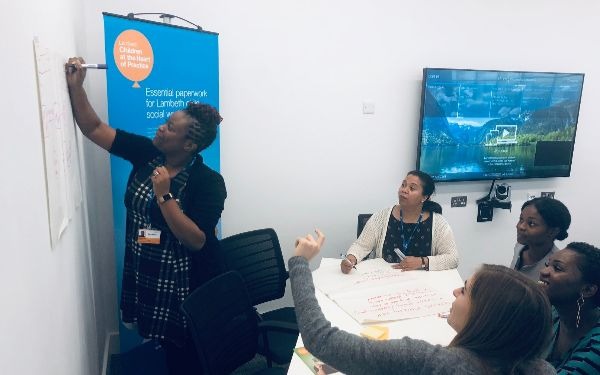“Having been on placement and heard others’ experiences and witnessing overstretched teams, you never know what you could be thrown in to.”
These were the fears playing on Jade Murrell’s mind before she started her Assessed and Supported Year in Employment (ASYE). In the build up to taking her first step on the social work career ladder, she’d heard plenty of horror stories.
But when she started her ASYE at Lambeth Council, working in the council’s bespoke Children at the Heart of Practice model, the reality proved very different.
It’s now a month since Jade and the 13 other newly qualified social workers in her cohort started their ASYEs at Lambeth. She’s about to take on her first cases, but now a step she feels excited rather than scared about thanks to Lambeth’s comprehensive one-month induction.
For their first two weeks Jade and the other ASYEs spent their time meeting senior leaders and learning about the council’s unique Children at the Heart of Practice model for children and families’ social work. The group also got introduced to Lambeth’s partner agencies and went on tours of the London borough and the various services within it.
The following two weeks saw the group spending time in their teams, observing practitioners, learning the systems and shadowing social workers on visits.
Now as she, and other members of the ASYE intake, including Fitnett Faisal, prepare to take on cases, the feeling is one of excitement rather than concern.
“The induction definitely brought down the nerves a bit,” Fitnett explains. “When I joined the team, I was still a bit nervous, but I knew from my observations that it was a really good team to be in, and when I had my supervision with my manager I knew they had planned it well.”
From application through to completing the ASYE, Lambeth’s approach is informed by participants, and is built around making the daunting step into practice more comfortable.
On application, new social workers can select a preference for which team they would like to work in, based on placement experience or just personal and professional interest. All 14 of the latest cohort got to join the team of their choice.
Free event with Professor David Shemmings
Come and hear from leading social work researcher, Professor David Shemmings, on the latest best evidence in supervision, and how this links in to Lambeth’s Children at the Heart of Practice framework. Monday 12th November, 18:00-20:00 at the Black Cultural Archives, Windrush Square, Brixton. Sign up here.
Improved experiences
Rina Wood, an advanced practitioner for newly qualified social workers who oversees the operation of the ASYE scheme, explains how the council’s improving the experience social workers get when taking their first big step into the profession.
The cohort model began this year and was developed after feedback from previous ASYEs.
This helped Lambeth target their training offer better at ASYEs who will now reach key milestones at the same time. But it also ensured social workers had an in-depth and welcoming induction period. The induction is designed to feel like an extension of their studies and take the edge off any initial concern that they may be working cases from day one.
“The cohort means they start together and can have a peer group. They can do things together,” Rina explains.
The 12-month programme is broken down into three-, six- and 12-month reviews. At each review objectives are set and reviewed as the practitioner’s skills develop. Every step of the process gives practitioners the skills they need to enter full-time frontline practice, and the confidence to use those skills in a safe way.
Participants benefit from recall days each quarter to get additional training, a reduced caseload to allow extra study days, and fortnightly supervision and group supervision.
What’s it like to work in Lambeth?
Reducing stress: Support services including telephone counselling, 24-7 telephone support, trauma aftercare and, dedicated online resource to support health and wellbeing.
Average caseloads in children’s services: 15, below the inner London average.
Local transport: The brand new Civic Centre where children’s services are based, opened in February 2018, is situated less than five minutes from Brixton tube and national rail station with a comprehensive London bus service connecting all corners of the borough.
Holiday entitlement: 26 days annual leave to start. With over 5 years continuous service but less than 10 – 31 days, and after over 10 years continuous service – 34 days. Continuous service can be carried over from other local authorities.
Working from home: Flexible-working is actively encouraged and promoted in Lambeth.
Local benefits: Council employees can benefit from heavily discounted tickets to local sporting events, discounted tickets to local theatre and film screenings, up to 50% off at local restaurants, and discounts on local health and wellbeing services.
ASYE salary: ASYEs will receive an approximate £2,000 salary increase by the end of their ASYE year.
Career development: Lambeth runs an accredited Children at the Heart of Practice 15 day training course on an annual basis, with a shorter 3 day course offered as a mandatory introduction to the practice framework for all staff. Advanced Practitioners run a range of additional training sessions throughout the year.
Systemic practice
Another element of the long induction aside from helping social workers feel comfortable in their surroundings is to help them get versed in the council’s bespoke model of social work, Children at the Heart of Practice, which requires social workers to work systemically.
Lambeth’s 15-day Heart of Practice development programme combines a three day course taught by Professor David Shemmings upon the modern use of attachment theory and a 12 day foundation year in Systemic Social Work with Children and Families, which will be submitted for accreditation to The Association of Family Therapists (AFT).
Lambeth’s training offer benefitted Louise Henry, a social worker in its children with disabilities team, who recently completed the programme.
“There are so many different areas of knowledge that you’re going to – at some point – come across in your practice. The training here was really good for me to build that knowledge, and as I think about how I want to progress it is useful to have that.”
‘Big step’
Louise felt the scheme was a “good transition” that helped her take the “big step” from student to social worker.
She was given cases slowly and co-worked them until she felt confident enough to begin making her own decisions.
“It was gradual rather than just being thrown into the fire,” she explains.
That support didn’t evaporate when her confidence built. A supportive and open team culture meant managers were readily available if a quick chat about a case was needed. Advanced practitioners would also accompany Louise on visits if she wanted extra support.
“We always have supervision in the diary, sometimes it’s difficult to keep it and it has to move around, but then there is the informal supervision: so being able to approach your manager, take the time out for half an hour, that’s happening a lot and that works on the ground. It comes from managers being really experienced, approachable and an atmosphere of working together,” Louise explains.
Louise, and her ASYE peers, were backed to block out time every fortnight as a reflection and study day, and she’s taken that into her practice, making sure she has time at the end of each day to reflect.
What stood out to her though was the accessibility of colleagues in helping her make step into practice more comfortably and confidently.
“It was nice to know who to go to for advice and leaning on colleagues who had years of experience. It was my fear that I would go into a specialist area and my knowledge was limited, but actually there is such a wealth of knowledge in the team, it was nice to be able to approach people to get some advice from them,” she says.
Growing their own
Nadine Hall, Lambeth’s principal social worker, says the focus on ASYEs is part of the council’s ethos to grow its own social workers by encouraging, developing and supporting new entrants into the council’s model and engraining them in relationship-based practice. It’s an ethos that can be seen by those taking on the job.
Jade and Fitnett are buoyed by the support they’ve received so far and the confidence they now feel to start working cases. They’re excited about having the opportunity to work in the Lambeth way – which is what attracted them to the authority in the first place.
“We are trying to keep families together and work in a holistic way to bring better outcomes for the community,” Fitnett explains.
Throughout the induction Lambeth’s belief in working with families in a meaningful way before bringing children into care as hammered home, while it was ensured “that we as social workers acknowledge an element of risk but that we are there to support and keep families together”.
Jade adds: “Before you go into social work you have grandiose ideas about what you want to do, but the reality can be really risk-adverse and that can dominate the way people operate and feels claustrophobic, and it can be disappointing. Lambeth, from the outset, convinced us that wasn’t the case.”




 Facebook
Facebook X
X LinkedIn
LinkedIn Instagram
Instagram